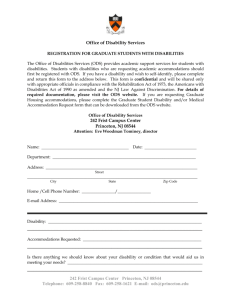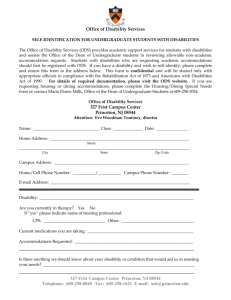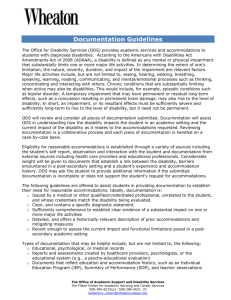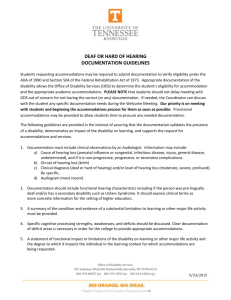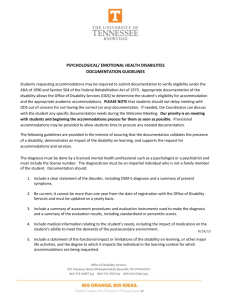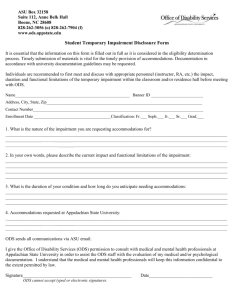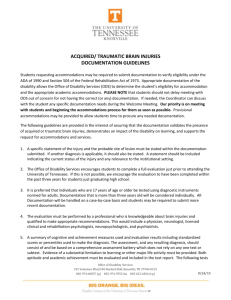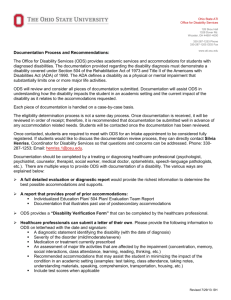ODS Policy and Procedure Manual
advertisement
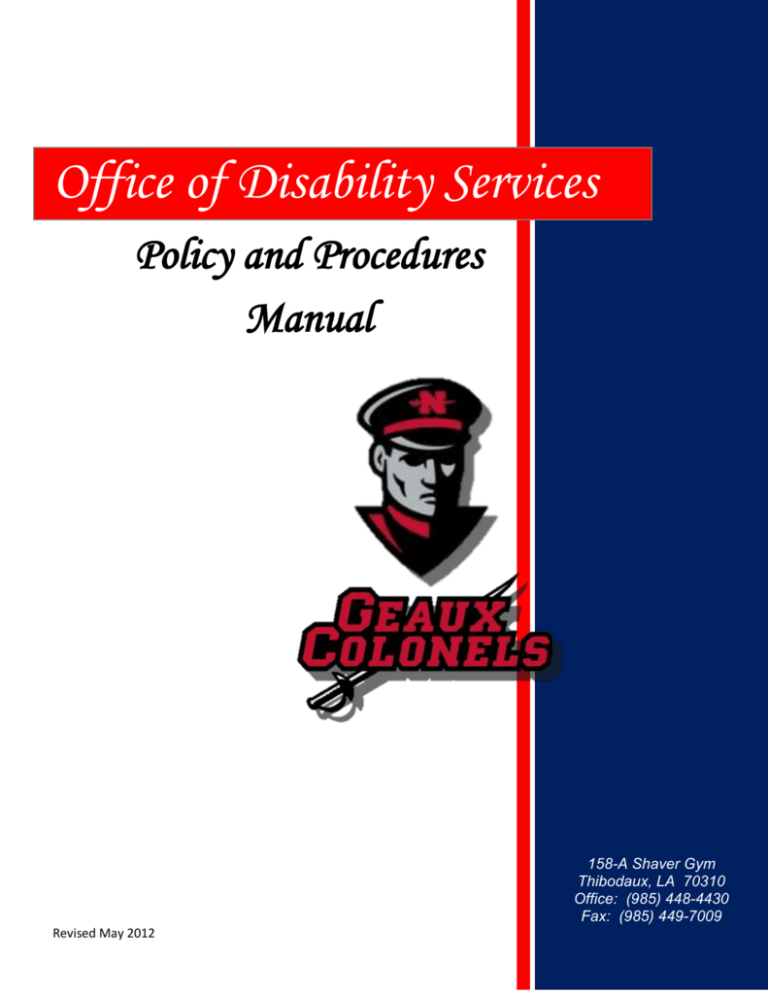
Office of Disability Services Policy and Procedures Manual 158-A Shaver Gym Thibodaux, LA 70310 Office: (985) 448-4430 Fax: (985) 449-7009 Revised May 2012 Page 1 of 12 Table of Contents Mission Statement ........................................................................................................................................ 3 Contact Information / Hours of Operation ................................................................................................... 3 Introduction .................................................................................................................................................. 3 Governing Laws ............................................................................................................................................. 3 Transition from High School to College ........................................................................................................ 4 Registration Procedure ................................................................................................................................. 5 Distance Leaner......................................................................................................................................... 5 Documentation Guidelines ........................................................................................................................... 5 Confidentiality ............................................................................................................................................... 6 Roles and Responsibilities ............................................................................................................................. 6 ODS............................................................................................................................................................ 6 Faculty/ Staff ............................................................................................................................................. 7 Student ...................................................................................................................................................... 7 Accommodations .......................................................................................................................................... 8 Assistive Devices / Technology ..................................................................................................................... 8 Absences ....................................................................................................................................................... 9 Personal Care Attendants (PCA) ................................................................................................................... 9 Service Animals ............................................................................................................................................. 9 Course Substitutions ..................................................................................................................................... 9 Grade Appeals ............................................................................................................................................... 9 Seizures and Other Medical Emergencies .................................................................................................... 9 Emergency Procedures ............................................................................................................................... 10 Medical Withdrawals .................................................................................................................................. 10 Handicapped Parking .................................................................................................................................. 10 Physical Accessibility ................................................................................................................................... 10 Grievance Procedure .................................................................................................................................. 10 ADA Housing ............................................................................................................................................... 10 Student Organization .................................................................................................................................. 11 Campus Resources ...................................................................................................................................... 11 Links/ Resources ......................................................................................................................................... 11 Frequently Asked Questions ....................................................................................................................... 11 Page 2 of 12 Mission Statement The mission is to provide services which ensure equal access to education for qualified students and referrals to both on and off campus resources. The Office of Disability Services (ODS) also provides guidance for campus faculty and staff to ensure federal obligations under the American with Disabilities Act is followed. Contact Information / Hours of Operation 158-A Shaver Gym P. O. Box 2087 Thibodaux, LA 70310 Phone: (985) 448-4430 TTY: (985) 449-7002 Fax: (985) 449-7009 Email: ods@nicholls.edu The hours of operation are 8:00 a.m. until 4:30 p.m., Monday through Friday. Hours subject to change at discretion of university officials. The office is closed on all university holidays. Introduction The Office of Disability Services (ODS) is a department in the Student Services unit which is in the division of Student Affairs. The purpose of this office is to coordinate the needs of students with documented disabilities with faculty, staff and administration to ensure equal education access. This manual is to serve as a guide for all faculty, staff and students. Governing Laws Nicholls State University is committed to providing equal education opportunities for persons with disabilities in accordance with Section 504 of the Rehabilitation Act of 1973, Title II of the Americans with Disabilities Act of 1990 and the Americans with Disabilities Amendment Act (ADAA) of 2008. The aforementioned laws protect individuals with disabilities from discrimination, allow access to all programs and services and ensure equal access to education. A disability is defined as a mental or physical impairment which substantially limits one or more major life activities. Substantially limiting is defined as being unable to perform a major life activity, or significantly restricted as to the condition, manner, or duration under which a major life activity can be performed, in comparison to the average person or to most people. A major life activity is defined as caring for oneself, performing manual tasks, walking, seeing, hearing, speaking, breathing, learning, and working. (American with Disabilities Act of 1990 and Section 504 of the Rehabilitation Act of 1973) Diagnostic categories: Clinical Disorders According to the Diagnostic and Statistical Manual of Mental Disorders: Fourth Edition Text Revision DSM-IV-TR(2000), ”mental disorders is conceptualized as a clinically significant behavioral or psychological syndrome or pattern that occurs in an individual and that is associated with present distress (e.g., a painful symptom) or disability (i.e., impairment in one or more important areas of functioning) or with a significantly Page 3 of 12 increased risk of suffering death, pain, disability, or an important loss of freedom.” Examples include, but are not limited to, anxiety disorders, bipolar, depression, and Autism/Asperger’s. Physical/Medical Medical disabilities include any physical illnesses or medical conditions that interfere with an individual’s daily functions. Examples include, but are not limited to, asthma, Cerebral Palsy, epilepsy, Irritable Bowel Syndrome (IBS), Spina Bifida and paralysis. ADD is “a persistent pattern of inattention and/or hyperactivity – impulsivity that is more frequently displayed and more severe than is typically observed in individuals at a comparable level of development.” Learning Disorders A learning disability affects the way an individual processes and articulates information. It is called the invisible disability. Examples include, but are not limited to, auditory processing disorder, Dyslexia and Dysgraphia. Visual Impairment A visual impairment is defined as “partially sighted, low vision, legally blind and totally blind, are used in the educational context to describe students with visual impairments.” (The National Dissemination Center for Children with Disabilities) Hearing Impairment A hearing impairment is defined as a “Sensorineural hearing loss (or nerve–related deafness)… damage to the inner ear. Conductive hearing loss… outer and middle ear. Mixed hearing loss… combination of conductive and sensorineural loss. Central hearing loss… damage or impairment to the nerves or nuclei of the central nervous system…” (Hearing Loss Association of America) Temporary Disabilities Temporary Disabilities include a short term medical/physical injury or condition which inhibits normal daily functions and are short-lived. The condition may last from a couple of months to three years. Examples include, but are not limited to, broken arm, problematic pregnancy and recovery from surgery or accident. Transition from High School to College While governing laws apply to both school districts and postsecondary schools, responsibility of the postsecondary institution significantly changes as compared to high school. In high school, school personnel were responsible for identifying and implementing the need of accommodations for students with disabilities. In postsecondary education, the student with the disability must self-identify with the disability service provider. It is the responsibility of the student to know and follow the postsecondary school’s procedures for requesting accommodations. Page 4 of 12 Registration Procedure The student must first self-identify by scheduling an appointment with the Director. At this appointment, the student should bring documentation that meets federal guidelines. If documentation is sufficient, the necessary paperwork will be completed and accommodations identified. The student will then have to attend each class one time, complete the Class Schedule Form and submit it to ODS. Accommodation letters will then be provided to the student to give to their instructors. Students will have instructors sign the Instructor Signature Form and return this form to ODS for completion of the registration process. Accommodations will not be provided until the Instructor Signature Form is received by ODS. Distance Learner Distance learners follow the same registration process as other students. Necessary forms can be emailed to students for completion. Completed forms can be faxed to ODS to begin the registration process but original forms must still be mailed. Once completed forms are received, ODS will provide the student with accommodation letters for their instructors. For the student’s convenience, the accommodation letter and Instructor Signature Form can be scanned and emailed to the student. Students can email the accommodation letter and Instructor Signature Form to their instructor. The Instructor Signature Form can be faxed, emailed or mailed to ODS to complete the registration process. Documentation Guidelines Documentation should be on letterhead, typed, dated and signed by a licensed professional. Federal guidelines identify seven elements of documentation: 1. 2. 3. 4. 5. 6. 7. Credentials of the evaluator(s). Diagnostic statement identifying the disability. Description of the diagnostic methodology/tool. Description of current functional limitations. Description of expected progression or stability. Description of current and past accommodations, services and/or medications. Recommendations for accommodations, adaptive devices, assistive services, compensatory strategies, and/or collateral support services. While Section 504 plans or IEPs are useful in identifying a student’s needs, it is not sufficient documentation for accommodations in postsecondary education. Standard timeline for documentation is within three years; however, there are exceptions. If an individual has a permanent diagnosis, meaning the condition will never cease, the documentation can be more than three years old. (Examples include medical conditions such as Cystic Fibrosis, Spinal Bifida, Traumatic Brain Injury (TBI), and vision/hearing impairments.) For acute diagnosis, the documentation may have to be within the past year. (Examples include emotional and psychological disorders.) Page 5 of 12 Confidentiality ODS is committed to ensuring that all information and communication pertaining to a student’s disability remains confidential as required by law. The following guidelines about the treatment of such information have been adopted by ODS and will be shared with students. These guidelines incorporate relevant state and federal regulations. 1. No one will have immediate access to student files in ODS except office personnel. Any information regarding a disability is considered confidential and will be shared only with others within the university who have a legitimate educational interest. This information is protected by the Family Educational Rights and Privacy Act (FERPA). 2. Sensitive information in student files will not be released except in accordance with federal and state laws. 3. A student’s file may be released pursuant to a court order or subpoena. 4. There may be occasions when the Director or Administrative Assistant will share information regarding a student’s disability at their discretion. Information will only be shared if it has been determined that there is an appropriate legitimate educational interest involved. 5. If a student requests a copy of an evaluation in their records, the student will have to contact the original evaluator for documentation. 6. A student has the right to review his/her own file with reasonable notification. Roles and Responsibilities ODS staff, campus faculty/staff and the student with a disability each have roles and responsibilities that are pertinent to ensuring equal access to education. Office of Disability Services ODS is devoted to providing academic support, accommodations, advocacy and referrals for students with disabilities. Responsibilities include: Reviewing student’s documentation, evaluating eligibility, and identifying reasonable accommodations. Requesting additional documentation, if needed. Providing accommodation letters to students. Consulting with instructors as needed to ensure understanding and implementation of accommodations. Assisting in resolving student conflicts and coaching students on self-advocacy. Advocating for equal access. Educating the university community on disability awareness. Referring students to on and off campus resources. Obtaining and maintaining assistive technology. Reviewing and updating department website each Fall and Spring semester. Page 6 of 12 Faculty/Staff Responsibilities include: Maintain confidentiality of the student registered with ODS and discuss disability related issues privately. Respect the privacy of the student’s diagnosis. They are not required under law to disclose their actual diagnosis. Discuss the implementation of accommodations with the student. Hold students with disabilities to the same academic and behavioral standards as all students. Ensure that the proposed accommodations do not substantially alter curricula standards. Ensure accommodations listed on the accommodation letter are implemented. Consult with ODS with any questions about the appropriateness of required accommodations. Do not provide accommodations for students not registered with a disability service provider (ODS or Dyslexia Center). Refer students who may possibly have a disability to ODS for assistance. Include a disability statement on syllabi informing students of ODS. Americans with Disabilities Act (ADA) Students with a documented disability are entitled to classroom accommodations under the ADA. To receive accommodations, contact the Office of Disability Services at (985) 448-4430 or 158-A Shaver Gym. Additional information can be found at http://www.nicholls.edu/disability/. Student Qualified students with disabilities have the right to an equal access to education. Responsibilities include: Self-identify to ODS. Provide ample time between initial request and implementation of accommodations. Provide ODS with medical documentation that meets federal guidelines. For the initial semester, meet with the Director to review documentation, identify accommodations and begin the registration process. Complete the registration process each semester requesting accommodations. Discuss with instructors the implementation of accommodations. Return the Instructor Signature Form before accommodations are implemented. Follow procedures according to ODS Student Contract. Have the same obligation as any student to meet and maintain the institution’s academic standards. Schedule a meeting with the ODS Director to review or change accommodations as needed. Page 7 of 12 Accommodations Accommodations for students are identified on a case-by-case basis and shall neither affect the academic curricula nor compromise educational standards. The identified accommodations may not be granted retroactively and are meant to ensure equal access to education. Examples of accommodations include, but are not limited to: Preferential seating Use of a tape recorder Extended time on tests and in-class assignments Note takers Oral testing Textbooks on CD/Kurzweil Assistive technology Captionists/interpreters During the registration process, students sign an agreement stating they will not abuse accommodations. If accommodations are abused, the student will meet with the Director of ODS to discuss consequences. Depending on the severity of the violation, ODS maintains the right to terminate services at any time. Assistive Devices/Technology ODS will maintain software and hardware to accommodate the needs of registered students. Registered students will receive instruction and training on technology needed for their accommodation. While students are not allowed unlimited access, the use of this technology is for testing purposes or to create audio textbooks. The following is an updated list as of 02/06/2012: Software • Dragon Naturally Speaking • MathType • Zoom Text • JAWS • Scientific Notebook • All Software in ITS Open • Kurzweil 3000 • Mega Dots • Magic Touch Hardware Braille machine & embosser Magnifying lens Touch screen computer Big keyboard/mouse Desktop computers, printers, and scanners Page 8 of 12 Absences Due to some chronic medical conditions, a student may qualify for the accommodation, “consideration if absent or hospitalized due to medical condition.” Faculty identify their attendance policy in their syllabi; this accommodation requests flexibility. The course requirements and the nature of the course must be taken into consideration. This accommodation does not allow the student to miss an unlimited number of classes. Personal Care Attendants (PCA) According to the Louisiana Department of Social Services, “The main role of a personal care attendant is to ensure that the student’s needs are being met.” Such duties include personal care/hygiene, assistance to/from destinations and any task that allows the individual to participate in daily activities/education. ODS does not provide PCA attendants. If a student with a disability is in need of a PCA, the attendant must be from an authorized agency. Attendants do not participate in class or complete the student’s work. Service Animals The student must first self-identify by scheduling an appointment with the Director. At this appointment, the student should bring documentation that meets federal guidelines. If documentation is sufficient, the necessary paperwork will be completed and accommodations identified. Course Substitutions Core courses and those that are deemed essential for a degree requirement cannot be substituted; however, if the diagnosis interferes with one’s ability to participate in a course that does not alter the curriculum, a substitution may be granted. The student must meet with and receive approval from the department head for the area of study. The Director of ODS can assist in the determination of course substitution. Once a determination has been made, the student must notify ODS of the change. Grade Appeals When appealing a grade, students must follow the rules and procedures outlined in the University Student Handbook (Section 5.1, pg. 17). If a student requests a letter from ODS for the appeals board, they must provide a reasonable amount of time for a response. The letter will state the student’s initial registration and participation in the ODS program. ODS will not provide statements of character for the student in the appeals letter. Seizures and Other Medical Emergencies If a student has a diagnosis that may require medical attention, the student is strongly encouraged to discuss their diagnosis with instructors, Housing, Residential Assistants (RA), etc. to ensure proper response if the situation should arise. Students should also identify themselves with University Health Services so they are aware of the student’s condition. Page 9 of 12 Students registered with ODS who have a condition that may require immediate attention will have a set protocol on the reverse side of their Letters of Accommodation for instructors. Emergency Procedures All students should familiarize themselves with the emergency procedures and exits posted in each classroom. If students with disabilities have concerns or questions about emergency procedures, they can contact the Safety Officer and/or ODS personnel. Wheelchair users should avoid the elevator during emergencies, remain on the stairway balcony and ask someone to notify emergency personnel. The stairway balconies are protected with fire safe doors. Emergency personnel are trained to check these areas. Medical Withdrawals To withdraw during a semester, undergraduates must contact University College (234 Elkins Hall) and graduate students must contact the office for their program of study. Handicapped Parking In order to receive handicapped parking on campus, the student must have a Nicholls decal along with a state issued handicapped tag/decal. If a student should have any issues with parking, he/she should contact Parking Services at (985) 448-4526 or visit their office located in Calecas Hall. Physical Accessibility ODS seeks to ensure that students with disabilities are provided equal access and reasonable accommodations appropriate to their disability in all programs offered through Nicholls State University. If a student is confronted with any barriers, they need to contact ODS and/or the ADA Compliance Officer. Grievance Procedure If a student feels like they have been discriminated against or harassed due to their disability, they should contact ODS and/or refer to the Student Code of Conduct Handbook (Section 7, pg. 32) for further assistance. If a student has an academic grievance, they should refer to the Student Code of Conduct Handbook (Section 5, pg.19). ADA Housing To request an ADA accessible room, contact Housing and Residence Life at (985) 493-3305 or go to http://www.nicholls.edu/housing/. Page 10 of 12 Student Organizations Beta Sigma Iota (BSI) is an honorary student organization at Nicholls State University whose mission is to provide advocacy services and awareness of disabilities. Although BSI is a student organization, it is also opened to faculty, staff, and alumni. For more information about this organization, please contact ODS. Campus Resources University Counseling Center (985) 448-4080 http://www.nicholls.edu/counseling/ University Health Services (985) 493-2600 http://www.nicholls.edu/health/ Career Services (985) 448-4517 http://www.nicholls.edu/career/ Women’s Resource and Services Office (985) 448-4470 http://www.nicholls.edu/wrso/ Office of Disability Services (985) 448-4430 http://www.nicholls.edu/disability/ Student Educators and Leaders (985) 448-4523 http://www.nicholls.edu/seals/ Campus Recreation (985) 448-4828 http://www.nicholls.edu/recreation/ Links/Resources For updated information on resources and other links which may be of further assistance, refer to the ODS website (http://www.nicholls.edu/disability/links-and-resources/). Frequently Asked Questions 1. Q. What constitutes a disability? A. A disability is defined in the American with Disabilities Act of 1990 and Section 504 of the Rehabilitation Act of 1973 as a mental or physical impairment which substantially limits one or more major life activities. 2. Q. What does “substantially limiting” mean? A. According to Section 504 of the Rehabilitation Act of 1973, substantially limiting is defined as being unable to perform a major life activity, or significantly restricted as to the condition, manner or duration under which a major life activity can be performed, in comparison to the average person or to most people. 3. Q. What is a “major life activity?” A. According to Section 504 of the Rehabilitation Act of 1973, a major life activity is defined as caring for oneself, performing manual tasks, walking, seeing, hearing, speaking, breathing, learning and working. Page 11 of 12 4. Q. What should I do if I have a disability and want to receive accommodations? A. If you have a disability, you will need to provide documentation of that disability to the Office of Disability Services. A qualified professional, who is licensed or certified to diagnose the disability in question, must provide the documentation. An appointment should be scheduled with the Director of the Office of Disability Services at Nicholls to review the documentation and the need for services. 5. Q. I received accommodations in high school and I used an Individualized Education Plan (IEP) or School Board Level Committee (SBLC). Can I use the IEP or SBLC as documentation? A. The IEP and SBLC are valuable resources of information, but it cannot be used as documentation for Nicholls. 6. Q. If I am a client of the Division of Vocational Rehabilitation is there anything special I should know? A. The Division of Vocational Rehabilitation will often fund services for you, if you are completing a college degree as a part of your DVR employment plan. You must advise the Director of the Office of Disability Services that you are using the Vocational Rehabilitation Office. 7. Q. How can I obtain a permit for accessible (handicapped) parking? A. To get a handicapped parking permit, contact Parking Services at (985) 448-4526 or visit their office located in Calecas Hall. 8. Q. I need a large desk or left-handed desk in my classroom. Who do I contact to request a desk? A. Contact ODS at (985) 448-4430 to get a large or left-handed desk delivered to your classroom. Please have the buildings and room numbers available when calling. 9. Q. I had an accident and I am on crutches or I have a cast on my hand. Can the Disability Services Office help me? A. Yes. The Office of Disability Services will assist students with temporary disabilities. You must bring a written statement from your doctor explaining the injury and the length of the temporary disability. If you injure your hand and you are unable to write, the Office of Disability Services can assist by providing a note taker and/or writer for exams. 10. Q. How does an instructor know what accommodations will be made? A. Once the student has provided the Office of Disability Services with their class schedule, letters are typed to each instructor identifying the student’s accommodations. The student should meet with each instructor to discuss the specific accommodations that the instructor finds most adaptable or appropriate for the class. Page 12 of 12
